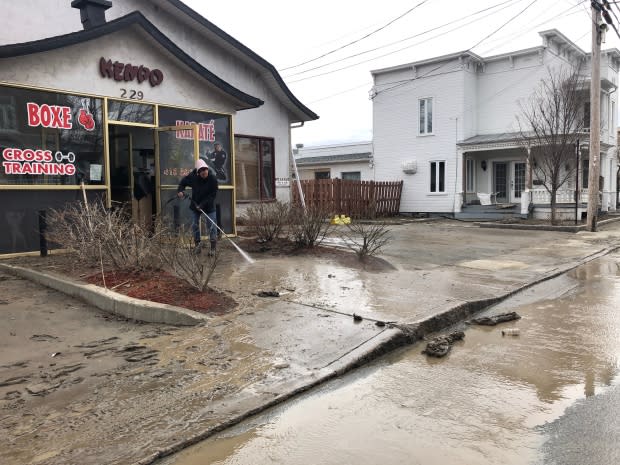Post-flood cleanup begins in Beauce region, but normalcy is a ways off
With water levels receding and some people now returning to their flooded homes in Quebec's Beauce region, officials warn it will be some time before life in the area gets back to normal.
The Chaudière-Appalaches region, which includes the area historically known as the Beauce, has been hardest hit by flooding so far, with nearly 2,000 flooded homes and 850 stranded people.
Residents of Sainte-Marie, Que., about 60 kilometres southeast of Quebec City, are used to the Chaudière River spilling its banks, but they say this year it rose higher than they've seen in decades.
"The heart of Sainte-Marie has been severely affected," said Public Security Minister Geneviève Guilbault, who toured Sainte-Marie with MNAs from the Beauce Tuesday. "This is a very sad situation we are seeing."

Flanked by half a dozen local mayors, Guilbault praised firefighters, civil security officials and volunteers for pitching in.
She also thanked the 100 members of the Armed Forces who arrived Tuesday morning to help with the aftermath — part of a contingent of 960 troops sent to flood-damaged regions of the province.
Business district under water
In Sainte-Marie alone, about 950 residences are flooded, and 795 people have been forced from their homes.
Just like in nearby Beauceville, much of Sainte-Marie's commercial district was flooded. Sainte-Marie Mayor Gaétan Vachon said the town hall has been under more than 1.5 metres of water.
Three elementary schools — two in Sainte-Marie and one in neighbouring Scott, Que. — will be closed indefinitely so they can be cleaned and the air quality tested. The school in Scott is under 2.5 metres of water and has been so damaged that students might not be able to return to the building this school year.

Electricity in much of the area has been cut, meaning homeowners who were relying on pumps to keep the water out of their homes are out of luck.
"[Hydro] can't restore the power if there's still water in the home because it's dangerous," said Vachon.
"I don't want people thinking we're enjoying cutting off electricity so their pumps won't work. We're taking it one step at a time, for safety purposes."
Sainte-Marie residents lucky, in a way
Sainte-Marie resident Diane Donahue said her daughter, who has no power or drinking water at home, stayed with her for a night.
Her son is returning from a vacation Tuesday and has had to make arrangements to stay somewhere other than his home because there is a third of a metre of water in his apartment.
But Donahue said compared to neighbouring municipalities such as Beauceville, Sainte-Marie is fortunate, in a way.
The water "came up very, very fast," she said, but ice didn't wash ashore, as it did elsewhere, causing more extensive damage.
She said community members are pitching in to help out those who have been affected, donating food and clothes and keeping in touch via social media to make sure everyone is taken care of.
Some who have lived near the river for years are talking about moving away, she said — an option the government hopes to make easier with its new compensation plan.
Dohanue said it's a good solution, albeit a tough one.
"There are some people who have lost all their retirement [savings], everything, but hopefully the government will pay or help to pay. And hopefully it doesn't take two to three years," she said.

